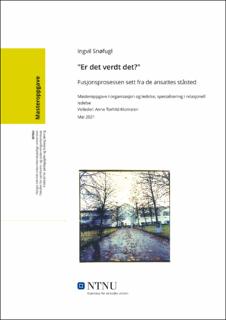"Er det verdt det?" Fusjonsprosessen sett fra de ansattes ståsted
Master thesis
Permanent lenke
https://hdl.handle.net/11250/2784416Utgivelsesdato
2021Metadata
Vis full innførselSamlinger
Sammendrag
Sammendrag
Erfaringer viser at fusjoner sjelden er vellykket. En av årsakene er at det menneskelige og kulturelle aspektet ved å slå sammen ett eller flere firma, ofte blir undervurdert. I stedet legges det ned mye arbeid knyttet til vurderinger av risiko og potensialet for økonomisk vekst. I denne studien retter vi derfor blikket mot menneskene og deres opplevelser, betraktninger og følelser knyttet til endringsprosessene. Problemstillingen i oppgaven er: Hvordan oppleves det å være ansatt i en fusjonsprosess?
Oppgavens problemstilling ble utforsket gjennom en kvalitativ tilnærming. Siden denne studien hadde til hensikt å undersøke nyansene i opplevelsene og erfaringene til de ansatte, falt valget på dybdeintervjuer. Det ble gjennomført dybdeintervjuer av fem ansatte. Informantene ble strategisk valgt ut til å være administrativt ansatte, siden de har jobbet tett med fusjonsprosessen over lengre tid og hadde dermed mange erfaringer med endringene.
Studien bygger på en case med moderbedriften Blå, som består av fire fusjonerte firmaer. Informantene hadde jobbet med prosessene for å legge til rette for fusjonen et knapt år da intervjuene fant sted. Empirien ble analysert ved hjelp av stegvis-induktiv-deduktiv metode hvor det foregår en induktiv prosess fra rådata til konsepter, mens det parallelt gjennomføres en deduktiv tilbakekobling fra det teoretiske til det empiriske.
Resultatene fra studien viser at ansatte opplever flere utfordringer i forbindelse med fusjonsprosessen: Økt distanse til ledelsen rent fysisk, men også kulturelt- og verdimessig. Parallelle univers bygges opp, som ifølge informantene skyldes redusert involvering og tilknytning til den nye bedriften. Informantene opplever også sviktende motivasjon, engasjement og glød i arbeidshverdagen.
Funnene i denne oppgaven bekrefter tidligere teori og forskning på både organisasjonsendringer, fusjoner, selvbestemmelse og motivasjon. Resultatene vil bidra til å øke den generelle forståelsen for hvordan det er å være i en fusjonsprosess for ansatte og danne grunnlag for videre teoriutvikling og forskning. Kunnskapen fra studien kan også tenkes å ha nytteverdi i forbindelse med andre liknende fenomener. Abstract
Experience shows that mergers are rarely successful. One of the reasons for this is that the human and cultural aspects of combining one or more companies are often underestimated. Instead, considerable efforts are made in connection with assessments of risk and the potential for economic growth. In this study, we are therefore aiming our focus on the people and their experiences, observations and feelings surrounding the change processes. The problem statement in this thesis is: What is it like to be an employee in a merger process?
The thesis' problem statement was explored using a qualitative approach. Since this study aimed to explore the nuances of the employees' experiences, we chose to conduct in-depth interviews. We carried out in-depth interviews with five employees. These informants were strategically chosen to be administrative employees since they worked closely with the merger process over a longer period of time and therefore had considerable experience with the changes.
The study is based on a case using the parent company Blå, which consists of four merged enterprises. The informants had worked on the processes to facilitate the merger for one year when the interviews took place.The empirical data was analysed using an incremental inductive-deductive method under which an inductive process takes place from raw data to concepts, while a parallel deductive backlink takes place from the theoretical to the empirical.
The results from the study show that employees experience multiple challenges in connection with the merger process: Increased distance to management, both in a purely physical sense, but also as regards culture and values. Parallel universes are built, which according to the informants are caused by reduced involvement and connection to the new company. The informants also experience failing motivation, engagement, and passion in their workday.
The findings in this thesis confirm previous theory and research on both organisational changes, mergers, self-determination, and motivation. The results will help increase the general understanding of what it is like for employees to be in a merger process and form a basis for further theory development and research. Knowledge from the study could also potentially be useful in connection with other similar phenomena.
